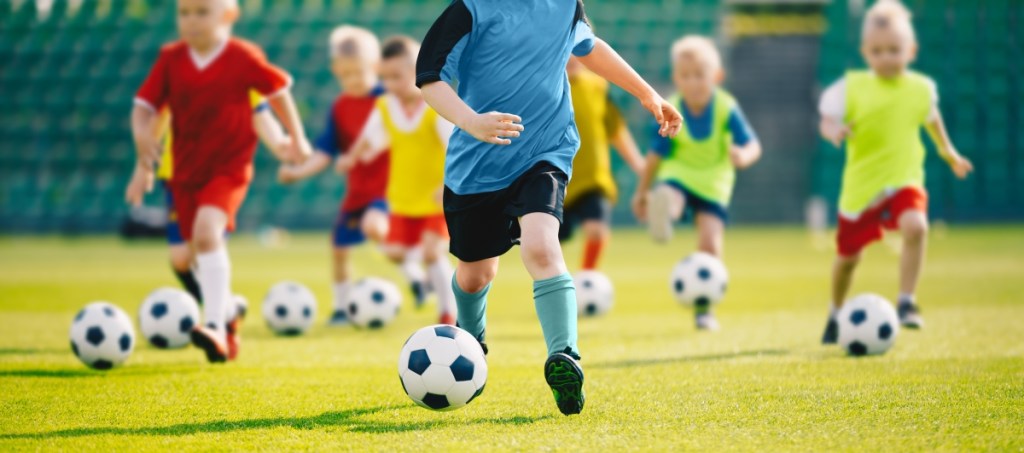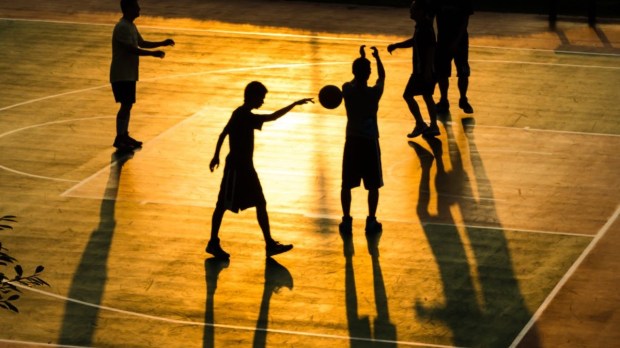These days, a lot of middle-schoolers are choosing St. Sebastian as their confirmation saint. I always have one or two Sebastian admirers each year in my sacramental prep class. When I ask if they like him because he’s so tough and amazing and was shot full of arrows, being the perfect example of the courage of the early Christian martyrs and their unbreakable faith, the answer is; “No, I like him because he’s the patron saint of sports.”
It doesn’t take a keen cultural commentator to notice that youth sports are exceedingly important these days. When I was a kid, we played sports all the time but mostly of the (un)organized variety. These were games among us neighborhood kids in our backyards. Organized t-ball and basketball through the YMCA weren’t year-round, so we had plenty of time in the “off-season,” to make up whatever activities we wanted. During the season, we practiced once per week and were lucky if we figured out how to finally catch a ball and throw to the correct base before the league was over. The true excitement and glamour of organized sports was drinking orange soda from a cooler when the game was over.
The time to get serious about sports wasn’t until around 8th grade, which is when the athletically inclined started thinking about which high school sports they wanted excel in. That’s when everyday practice, summer leagues, and weekend tournaments started in earnest.
Our sports obsession
I cannot remember a single instance when sports interrupted Sunday morning church or took us on weekend trips to out-of-town tournaments. Now, though? Kids are increasingly losing time for church, friends, and family as sports take over. St. Sebastian may be the patron saint of our junior athletes, and I hope he’s watching over them, but I’m sure the great saint would be happier with less sports, better Mass attendance, and more family time.
I’m not intending, though, for this essay to be a complaint about organized youth sports. This essay is actually about how great organized youth sports are.
Clearly, sports are important. It’s where we put our focus, effort, and money. The obsession with organized sports can go way too far, this much is obvious, but the response shouldn’t be complete opposition to athletics. Sports are important for a reason, and it’s important to figure out why. Knowing this, it’s easier to keep our participation at a healthy level.

The chaos of Calvinball
As much as I loved the games that us kids created – our rogue roller-hockey games, the chair we stuck behind the batter to mark the strike zone, the swingset right in the middle of our football field – there was something different about organized league games. They felt more important.
If you’re familiar with Calvin and Hobbes comics, then you’re aware of the rules of Calvinball. The rules are that there are no rules. Calvin played the game alone because he disliked cooperating with teammates on the school baseball team, didn’t think he was very good at sports, and didn’t want to listen to the coach. Often, the informal backyard games of my childhood devolved into a version of Calvinball. There’s something amusing and even admirable about the imagination required to play, but I don’t think it’s actually good that Calvinball would replace organized sports entirely. What Calvin rejects — teamwork, improving at difficult skills, and following the instructions of a coach — are all important virtues to develop.
The value of organized sports
It’s good for children to play at their own games in which they make their own rules and arbitrate their own disputes, but it’s also good for them to respect and learn from a coach and adhere to rules enforced by adult referees. Desiring excellence at physical endeavors is also a positive thing. Even when kids run against the truth that, maybe, they aren’t particularly gifted at something, this too is a life lesson. It’s even good to desire victory in competition while at the same time developing graciousness in defeat and magnanimity in triumph.
Learning how to win and lose in a low-stakes environment like youth baseball pays dividends later in life. Sports teaches us the rare skill of listening to a boss, balancing creativity with following instructions, and remaining determined to put in the practice to improve at new work skills.

Keeping it fun
This is why I’ve had all my children play organized youth sports. Before high school, none of the kids are allowed to play year-round or join a travel team, but they all need to play on some team during a sports season. The pressure is low – all I ask is that they give it their best effort – and they can always switch sports. No need to commit long-term. If they don’t like it or are indifferent, we don’t force our teenagers to continue playing sports. We have one teen daughter who isn’t interested at all in sports and that’s perfectly fine. On the other hand, our teenagers who have shown interest in committing more seriously to a particular sport are allowed to put more time into it.
Even though my dream of playing in the NBA never panned out (a 6-foot-tall guy with glasses isn’t exactly the type of player teams are desperate to recruit), I’m still glad I’ve played sports — both organized and casual — all my life. I’m also glad that sports haven’t taken over our family life even as it remains a joy to watch my children play games they love. I’ve watched them develop motivation and determination as they rise to new challenges and learn lessons that will linger with them their entire lives.
St. Sebastian, patron of athletes
Perhaps this is why St. Sebastian loves sports so much and why he’ll keep praying for all his confirmandi, because he knows that sports aren’t about the game itself but about learning to live well. All our lives, we are presented with opportunities to play the “game” with courage, integrity, and joy. I hope to confront those challenges like a determined athlete, never giving up, always excited by the possibility of hard-won victory.



